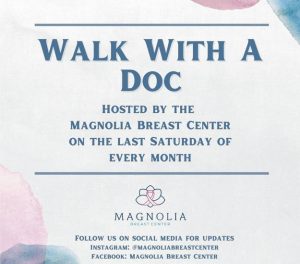By Sharla Gayle Patterson, MD, MBA


It does. Increased physical activity is associated with decreased risk of cancer, better survival, and decreased risk of cancer coming back.
Small changes quickly add up to big results. Here are some tips to stick to a healthy new year.
1. Find your group. Working out alone is boring and without accountability, we make ‘excuses’ that don’t hold water. A workout buddy keeps us accountable. One group that is available in Naples and across the nation is Walk With A Doc.
2. Be realistic. Social media, magazines, and ‘reality’ shows are not realistic. Never compare your insides with media outsides. Those outsides are planned meticulously with lots of behind-the-scenes support. No one wakes up with perfect hair and makeup. Keep it real.
3. Be safe. Weight loss is not the goal. The numbers on the scale don’t tell the whole story. Muscle mass weighs more but a higher muscle mass translates into a higher metabolic rate. The resting metabolic rate is the number of calories you burn in a day at rest. Strength training and building muscle mass allows you to work less and burn more calories!
4. Love yourself. It’s not easy. Every day try your hardest and when you close your eyes that night, put it behind you. Tomorrow morning is a new day with a chance to try again. Going to bed each night knowing you did the best you can helps you get restorative sleep and start fresh again in the morning.
Why walk? Studies from the American Cancer Society and the National Cancer Institute have shown a reduced risk for 13 different types of cancer in those who exercise regularly.1,5 The American Cancer Society recommends that adults participate in 150 minutes of moderate intensity exercise, or 75 minutes of vigorous activity each week.1,2,5 Many don’t think of walking as moderately intense, however according to the ACS walking 3mph or 20 minutes per mile is considered a moderately intense form of exercise, which helps reduce the risk of cancer occurrence if done at least 150 minutes per week.1,5
What about breast cancer? Regular and consistent exercise at moderate intensity can in fact reduce risk of breast cancer!3,5,6 A meta-analysis from 2016 showed women who are more physically active have a 12-21% reduction in breast cancer risk.3 Reduced risk of cancer is not the only benefit of physical activity. It also has been linked to reduced inflammation, improved immune function, obesity prevention, and other metabolic changes that reduce cancer risk and recurrence.2,5 In 2019, systematic review of a multitude of observational studies found that physically active breast cancer survivors had a 40% lower risk of death from breast cancer compared to those who were less physically active.4
What else can walking do for me? Being physically active, especially exercising together, can be fun! Come find a new love for walking with us, it’s healthy, safe, and free! Also take advantage of this opportunity to have meaningful conversations with other participants and fellow survivors, as well as your very own health care professionals. Come join us and Walk with a Doc!
Dr. Sharla Gayle Patterson and the Magnolia Breast Center team are pleased to announce that Dr. Tam Mai will be joining our practice on January 9, 2023. Dr. Mai is a fellowship trained breast surgeon certified by the American Board of Surgery.
Dr. Mai is coming to us from Springfield Clinic in Springfield, Illinois, where she has practiced for the past 8 years. She received her medical degree and completed her surgical residency at the University of South Alabama College of Medicine. Following this, Dr. Mai completed a fellowship in Breast Surgical Oncology at the University of Southern California’s Keck School of Medicine under the supervision of the world-renowned breast cancer surgeon, Dr. Melvin Silverstein.
Dr. Mai’s specialties include comprehensive evaluations in benign and malignant breast diseases with expertise in oncoplastic surgery, skin and nipple sparing mastectomy, and management of high-risk patients.
In her free time, Dr. Mai enjoys traveling, cooking, exercising, weight training, yoga, reading, and spending time with her family.
Dr. Mai is passionate about providing quality breast care and expanding the indications for breast conserving therapy.
You can request a consultative evaluation with Dr. Mai on our website at magnoliabc.com or call our office at 239.758.PINK (7465).
We look forward to seeing you soon!
MAGNOLIA Breast Center
3530 Kraft Rd, Suite 202, Naples, FL 34105
239.758.PINK (7465)
magnoliabc.com
1. Cristol, Hope. “Information and Resources about for Cancer: Breast, Colon, Lung, Prostate, Skin.” American Cancer Society, 17 May 2016, https://amp.cancer.org/.
2. “Physical Activity and Cancer Fact Sheet.” National Cancer Institute, 10 Feb. 2020, https://www.cancer.gov/about-cancer/causes-prevention/risk/obesity/physical-activity-fact-sheet#:~:text=Breast%20cancer%3A%20In%20a%202019,least%20physically%20active%20(28).
3. Pizot C, Boniol M, Mullie P, et al. Physical activity, hormone replacement therapy and breast cancer risk: A meta-analysis of prospective studies. European Journal of Cancer 2016; 52:138-154.
4. Spei ME, Samoli E, Bravi F, et al. Physical activity in breast cancer survivors: A systematic review and meta-analysis on overall and breast cancer survival. Breast 2019; 44:144-152.
5. Moore, et al. Leisure Time Physical Activity and risk of 26 types of Cancer in 1.44 million types of adults. JAMA Intern Med. 2016 June 01; 176(6): 816–825. doi:10.1001/jamainternmed.2016.1548
6. World Cancer Research Fund, American Institute for Cancer Research. Food, Nutrition, Physical Activity, and the Prevention of Cancer: a Global Perspective. Washington DC: AICR; 2007.
 Southwest Florida's Health and Wellness Magazine Health and Wellness Articles
Southwest Florida's Health and Wellness Magazine Health and Wellness Articles

